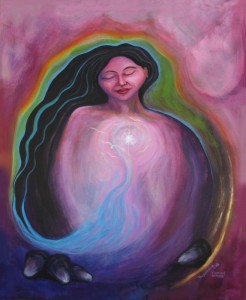
Emotional Healing by Beth Budesheim: http://fineartamerica.com/profiles/beth-budesheim.html
“Ultimately we think the placebo is about the power of the imagination, trust, and hope, in the medical encounter.”
– Ted Kaptuchuk, Associate Professor of Medicine, Harvard Medical School
It is not often that “imagination” comes up in discussions about medical research, but it may be at the heart of one of the longest-running mysteries in western medicine: the placebo effect.
Placebos have long intrigued me; the idea that pain or illness can be alleviated through “fake” medicines like sugar pills — presumably because the patient believes she has received a real treatment — has fascinating implications for the power of “mind over body.” But at the same time, “placebo” has become a bad word for many in medicine — a symbol of deception that raises images of snake-oil salesman, or an annoying variable in medical research.
But according to Professor Ted Kaptchuk, the placebo effect is much more complex and profound that we have assumed. Kaptchuk, Director of the recently founded Program in Placebo Studies and the Therapeutic Encounter at Beth Israel Deaconess Medical Center in Boston, was featured this past week on NPR’s Science Friday. He shared the results of a study in which placebos were effective even when the patient knew he was receiving a placebo!
So if a placebo is not about tricking patients, how does it work? Kaptchuk and his colleagues have some answers, and they are surprisingly relevant for cultural organizers. “The placebo,” Kaptchuk argues, “is a way of measuring the effect of…the act of caring for a person.” The placebo effect is about everything besides the medication or formal “treatment” offered.
First of all, Kaptchuk explains, the effect is about the relational interaction between doctor and patient. It is about “the words, the gestures, eye contact, warmth, empathy, compassion.” Healers have long known that relationships are important, and this offers important support for that understanding.
More than that, Kaptchuk says that the placebo effect is about the healing power of symbols: “white coats, diplomas, prescription pads.” And it is about rituals as well, “the ritual procedures of medicine: waiting, talking, disrobing, being examined, then being treated.” I have written a lot about the power of symbol and ritual to unite people, to change the way we think about ourselves, and to reshape our society. This research suggests that they also have the power to directly affect our physical health and well being as well. In a way this is a rediscovery of very old knowledge — healing has long been tied up with ritual, symbol, and religion across many cultures. And it is in line with some new thought about the role of hope in healing and resilience.
There are limits to the placebo effect, and it works better for some kinds of illnesses than others. Sometimes there is no physical healing, but patients experience’s improve, which is often the goal. But if we look at the placebo effect not as a deception or as an annoyance, but as a window into the importance of symbol, ritual, and relationship, we may be surprised at the paths our inquiries take us down. Those of us who wield symbols and rituals as the tools of our trade should take note.



